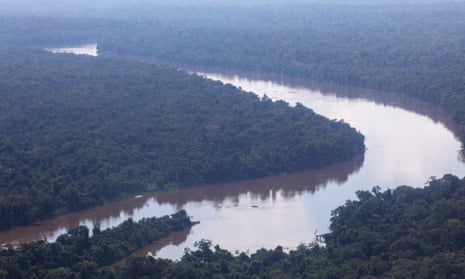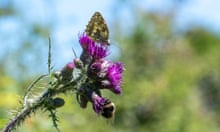Wealthy nations could be asked to make significant financial contributions to biodiverse countries such as Brazil under proposals put forward during talks on a global agreement to halt and reverse biodiversity decline.
Paying countries with life-sustaining ecosystems such as the Amazon rainforest billions of pounds a year for the services those ecosystems provide for the world was proposed during negotiations on a Paris-style UN agreement on nature in Rome last week.
Conservationists hope the eventual agreement will provide an accessible, science-based global goal on biodiversity loss, equivalent to targets to limit global heating, following warnings from scientists that humans are driving the sixth mass extinction event in Earth’s history.
Delegates from more than 140 countries were responding for the first time to a draft 20-point agreement that includes proposals to protect almost a third of the world’s oceans and land and reduce pollution from plastic waste and excess nutrients by 50%.
Q&AWhat is biodiversity and why does it matter?
Show
Biodiversity – short for biological diversity – is the variety of life on Earth, from the tiniest bacteria to the largest mammals. The air we breathe, the water we drink and the food we eat all rely on it – without plants there would be no oxygen and without bees to pollinate there would be no fruit or nuts.
Scientists are still trying to understand how the web of life fits together and, despite advances in technology, we can still only guess at the true number of species on our planet. But Earth is experiencing the largest loss of life since the dinosaurs, and humans are to blame. The way we mine, pollute, hunt, farm, build and travel is putting at least one million species at risk of extinction, say experts. The sixth mass extinction in geological history has already begun, some scientists assert, with billions of individual populations being lost.
The five biggest threats to biodiversity are: changes in land and sea use; direct exploitation of natural resources; the climate crisis; pollution and invasive species.
The extinction of animals, insects, plants, and all living things has huge knock-on effects. Species have to work together in harmony in order to thrive and provide the essential services humans need to survive. The services provided by ecosystems are estimated to be worth trillions of dollars. About half of global GDP – equal to $42tn (£37tn) – is dependent on the healthy functioning of the natural world, according to the UN.
The world has so far failed to meet any UN targets on halting the loss of nature but new targets will be set at the Cop15 biodiversity summit in Montreal in December 2022.
During the talks at the Food and Agriculture Organization headquarters in Rome, several African and Latin American countries expressed the need for financial support to protect life-supporting ecosystems and develop mechanisms to share profits from discoveries linked to their genetic resources, such as new drugs.
The negotiating team for Brazil, led by Leonardo Cleaver de Athayde, was particularly robust about the need for financial payments for ecosystem services.
Small-scale schemes to protect ecosystems already exist under the UN climate convention, with countries with large forests receiving payments to reduce emissions from deforestation and degradation.
When asked whether obtaining sufficient financial backing from developed nations for so-called mega biodiverse countries would be the key sticking point in the agreement, senior UN officials cautioned that negotiations were ongoing but said the targets would not be implemented without resources.
Francis Ogwal, a co-chair of the negotiations, said: “When you’re talking about biodiversity, it’s not just biodiversity, it’s our life on this planet. If the loss of biodiversity continues at this pace, human beings won’t be on this planet.
“It’s about us assuring our survival here and for generations to come. So really, on that basis, why wouldn’t more money be put there? It’s for our own good.”
Countries with high biodiversity include China, Colombia, the Democratic Republic of the Congo and India, according to various definitions. The payments would support poorer countries with high biodiversity to help conserve life-supporting ecosystems.
This week’s talks had been scheduled to be held in the Chinese city of Kunming, and governments are expected to adopt the agreement at a summit there in October, replacing targets for the previous decade that countries largely failed to meet.
The negotiations were moved to Rome following the outbreak of the new coronavirus, and the Chinese delegation was not able to attend due to quarantine measures. The planned Kunming agreement has been highlighted as the first time China is taking the lead on environmental global issues, and UN officials said officials had been in contact from afar.
Another co-chair, Basile van Havre, said: “In terms of China’s engagement with the discussions, I don’t know how many hundreds of WeChat messages I’ve exchanged with Beijing and the delegation here. Their team were up during our schedule, listening and engaging.”
Despite warm words from some negotiators, many NGOs expressed disappointment with the ambition of the talks and the level of urgency following the first round of negotiations.
Marco Lambertini, the director general of WWF International, said: “Our relationship with nature is dangerously unbalanced. One million species are threatened with extinction and the way we currently produce and consume is risking irreparable damage to the very natural systems that underpin human wellbeing and prosperity, from forests to oceans and river systems. With science and society calling for urgent action on nature, alongside climate, it is disappointing to see limited ambition and leadership displayed by countries in Rome.
“The world must not miss the chance this year’s UN talks provide to secure a Paris-style agreement for nature that includes a clear 2030 set of science-based and measurable goals and targets. It will now be critical that countries step up to the challenge in the next round of negotiations and ensure the draft agreement arrives in Kunming with the necessary ambition to deliver a nature-positive world by the end of the decade.”
At the World Economic Forum at the start of this year, biodiversity loss was highlighted as the third biggest risk to the world in terms of likelihood and severity.
The next round of formal negotiations will be held in Cali, Colombia, in July.
Additional reporting by Sam Cowie.








